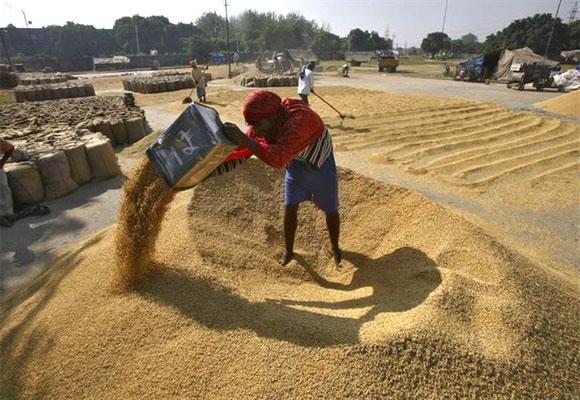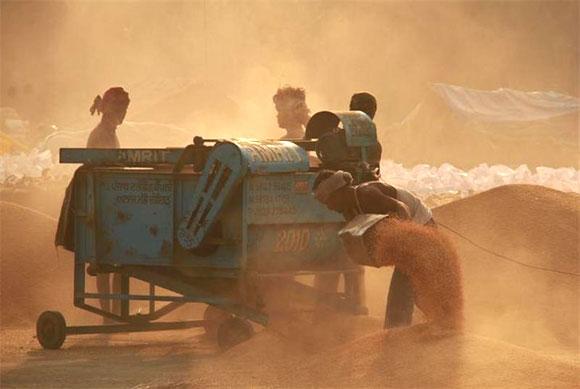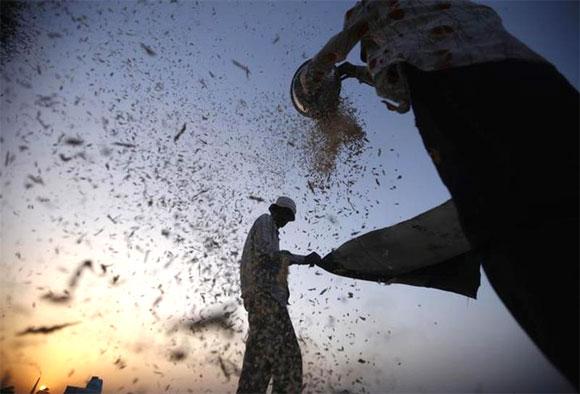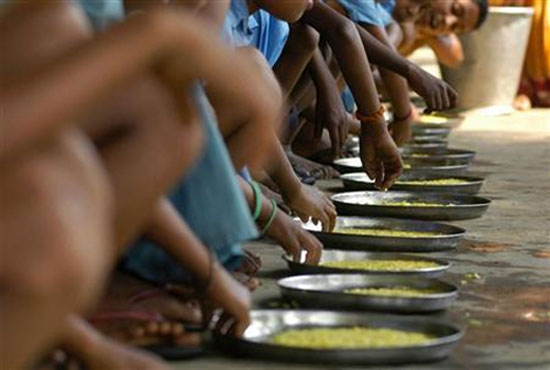 | « Back to article | Print this article |
India's cheap food plans to prove costly for government
Providing cheap rice and wheat to 67.5% population would raise subsidy bills 45% to up to Rs 1.3 trn, and the country.
India may soon pass a new law to give millions more people cheap food, fulfilling an election promise of the ruling Congress party that could cost about $23 billion a year and take a third of annual grain production.
The National Food Security Bill, which aims to feed 70 per cent of the population, could widen India's already swollen budget deficit next year, increasing the risk to its coveted investment-grade status.
The ambitious bill, a priority for Congress President Sonia Gandhi, will raise India's annual food subsidy spending by 45 per cent.
It promises wheat and rice at a fraction of the cost to some 810 million people, expanding current handouts to roughly 318 million of India's poorest.
Critics say the food bill is little more than an attempt to help Congress, reeling from corruption scandals, win re-election in a vote expected by next May.
Click on NEXT for more...
India's cheap food plans to prove costly for government
The government has already budgeted Rs 900 billion ($16.6 billion) for the scheme in the current fiscal year ending March 2014. If the bill is passed, it will need to come up with as much as Rs 1.3 trillion in 2014/15, adding to a total subsidy burden that already eats up about 2.4 per cent of gross domestic product.
"It is very difficult to say whether the government will be able to get the Food Security Bill passed or not, but it is definitely going to further widen the budget deficit," D H Pai Panandiker, head of private think-tank RPG Foundation, said.
"The finance minister is already worried about the budget deficit, and it is going to add to his agony."
Reducing fuel and fertiliser subsidies would be the best way of mitigating the costs, Panandiker said. Other measures will also be needed to fund the plan, which may include spending cuts and higher taxes.
Finance Minister Palaniappan Chidambaram said in March the rollout of the new food subsidies was unlikely to happen before the middle of the current fiscal year, which started April 1, curbing the financial cost. Chidambaram aims to cut the fiscal deficit to under 4.8 per cent of GDP in the current year from around 5 per cent in 2012/13.
Click on NEXT for more...
India's cheap food plans to prove costly for government
Bulging stocks
Feeding its poor is a matter of urgency for India, home to about 25 per cent of the world's hungry poor, according to the World Food Programme, the food aid arm of the United Nations.
India is one of the world's biggest producers of rice, wheat and sugar, but it is also one of the largest consumers with a 1.2 billion population. It exports little and builds up stockpiles to cover handouts, which are now overflowing after bumper harvests, which have come close to 200 million tonnes a year of rice and wheat.
The law would have little effect on India's export volumes in a good crop year, but "in a year of shortage, there could be some impact" on international markets, a Singapore-based trader said.
The bill will give rice at 3 rupees per kg to the poorest people, less than 10 per cent of current retail prices, and wheat at 2 rupees per kg.
The government estimates it would need about 61 million tonnes of grains, only 3 million tonnes than it currently makes available, to provide the extra food, hoping better distribution systems and a clamp-down on corruption will reduce wastage.
Click on NEXT for more...
India's cheap food plans to prove costly for government
Last year only about 41.4 million tonnes was actually distributed by state governments in cheap food schemes.
The Congress party, which leads the ruling coalition, wants to pass the bill by May 10 when the parliament session ends.
But debate this week has been disrupted by opposition parties, which say the government is pushing the populist move as a smokescreen to avoid defending itself over corruption scandals.
Last week, police arrested the nephew of Railway Minister Pawan Kumar Bansal in connection with allegations that he accepted a bribe of $160,000 to arrange the promotion of a railway official.
The government may try to pass the bill again in the parliamentary session that starts around July 23 or push it through without a vote when parliament is not sitting, using special constitutional powers. It must then win approval for the bill within six weeks of parliament's return.
($1 = 54.2250 Indian rupees). Additional reporting by Mayank Bhardwaj

© Copyright 2024 Reuters Limited. All rights reserved. Republication or redistribution of Reuters content, including by framing or similar means, is expressly prohibited without the prior written consent of Reuters. Reuters shall not be liable for any errors or delays in the content, or for any actions taken in reliance thereon.



